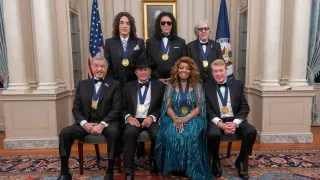December 7, 2024
Nadia Caterina Munno (aka The Pasta Queen) Shares Her Passion for Italian Cooking
Steve Duffy READ TIME: 5 MIN.
Her name is Nadia Caterina Munno, but the world knows her as the Pasta Queen. The strikingly beautiful, Roman-born chef and entrepreneur has some 5.6 million followers on social media, two best-selling cookbooks "The Pasta Queen: A Just Gorgeous Cookbook" and "The Art Of Italian Cooking", and a Prime Video television program – "The Pasta Queen" –that placed amongst the network's top streamed shows when it made its debut in late October. The show's 13-episodes air through the New Year.
Italy is a country of many regions, each with its distinctive kind of pasta and preparation. On this cooking and travel show, Nadia travels through Italy spotlighting a region and does a deep dive on its unique pasta recipes around her native land, then returns to her Florida home to prepare the dish. For instance, on the show's first episode she travels to Puglia, the region where "Orecchiette" (which means "little ears") originated. In the Puglian city of Bari, she sits with the local women who make pounds of the pasta every day. Then returning to her Florida home, she makes pasta with her four children before preparing Cozze alla Tarantina. And keeping the show a family affair, she visits a mussel farm with her father Tonino and learns that the waters where the mussels are harvested is so clean that they can be eaten live (while wiggling.)
Collider calls the show "as entertaining as it is mouthwatering." Adding, "Unlike most travel cooking shows that find our favorite personalities visiting different regions around the world, The Pasta Queen dives deeper, offering an immersive journey through Italy's rich food traditions. Best known for her vibrant social media presence, Munno brings her larger-than-life personality to the small screen, turning each episode into a sincere and warm love letter to Italian culture. The New York Times bestselling author breaks free from the constraints of TikTok's two-minute videos and Instagram's 1:1 grids, inviting viewers into an intimate, playful exploration of regional specialties across visually stunning settings."
Watch the trailer for Prime Video's "The Pasta Queen."
Nadia's passion for pasta began at an early age. "I was born and raised in The Eternal City and spent my childhood surrounded by pasta," she writes on her webpage. "My family, known in Rome as the 'Macaronis,' has been making pasta and wine in our factory in Southern Italy since the 1800s. From a very young age I was taught how to make homemade pasta with my own two tiny hands and these lessons from my aunties and nonnas are ones that I am forever grateful for. Spending hours in the kitchen surrounded by the women I love, with a Telenovela playing in the background was a pivotal time in my life. It made me who I am and inspired what has become The Pasta Queen."
EDGE spoke to Nadia about her love of pasta, her career, and her Prime Video series, produced by Reese Witherspoon's Hello Sunshine.
EDGE: Could you tell us a little bit about yourself?
Nadia Caterina Munno: My name is Nadia. People know me as the Pasta Queen. I was born and raised in Rome. I come from a long line of pasta makers, and I have a new TV show on Prime Video called "The Pasta Queen."
EDGE: What inspired your new show?
Nadia Caterina Munno: My family's business, my family's food passion, and my love for my country.
EDGE: With so many incredible regions you visit on the show, how did you decide which ones to include?
Nadia Caterina Munno: The regions you will see in this 13-part series define me. I grew up and lived in these regions at different stages of my life. The Emelia Mania region is a region that my mom and I often visited for her work. These regions inspired me to cook and love the way I do. They also helped me with my sense of fashion.
EDGE: How serious is pasta prep in Italy?
Nadia Caterina Munno: Not that serious. The Italians have an uncanny ability to do the most amazing things with the most unserious attitude. I don't know if you've noticed, but Italians are known for the LA Days lifestyle, taking it easy and having extremely long lunches and dinners. But when it comes to making things, wow. They are masters of cars, fashion, and pasta.






